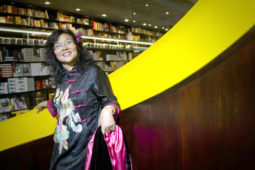 |
| Zhang Lijia |
Stability is the key word for China's political leaders, but when
author Zhang Lijia of
Lotus: A Novel on prostitution in China looks back at her last thirty years for her life, she sees a unbelievable change, she tells in a wide-ranging interview in the
Australian Financial Review.
The Australian Financial Review:
Zhang says today's situation is very different from 30 years ago. The initial working title for her memoir was Frog in a Well, to convey her feelings of being trapped in the factory, only able to see a patch of sky that hinted at the world beyond. At the factory, she was banned from wearing lipstick or dating and female workers had to prove they weren't pregnant by showing evidence of bleeding every month.
Today, Zhang says people feel more comfortable with the freedoms they have. This has stopped people from speaking out about the government's tighter control of society, which Zhang finds frustrating.
"I find it incredible so many people have swallowed the line that what we want is stability. I was even having a conversation with someone who supported me and took part in the demonstration [a group of 300 factory workers organised by Zhang to march in late May 1989 as a show of solidarity with the protesters in Tiananmen Square] and he saw that as a youthful, impulsive action and said China now needed stability."
Zhang tells me she left China in 1990 to live in Britain but returned to Beijing three years later and began working for the ABC's then China correspondent Ali Moore as a fixer. She resigned from the ABC to become a journalist in her own right and her writing has appeared in the South China Morning Post, Far Eastern Economic Review, Japan Times, The Guardian, Newsweek and The New York Times...
Then: doing research on prostitution has not been easy.
"Prostitution is still a very sensitive topic," she says, with a distinct British accent, honed by years of listening to the BBC. Zhang also lived in Britain during her marriage to British reporter Calum MacLeod, which ended 12 years ago. The couple have two daughters.
"Even academics have trouble to do research. They cannot get funding," she says "In China prostitutes are stigmatised. People think they are dirty and cheap. A few years ago there was a big crackdown [on the sex industry] in Dongguan. Prostitutes were paraded in the street."
Zhang says a film director showed some interest in the novel but he was told by the authorities "prostitution doesn't exist in China".
More in the Australian Financial Review.
Zhang Lijia is a speaker at the China Speakers Bureau. Do you need her at your meeting or conference? Do get in touch or fill in our speakers' request form.
Are you looking for experts on cultural change in China? Do check out this list.


